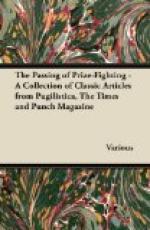Edentulous persons.
It happened a long time ago. Higgins, Mackenzie and I, three irresponsible subalterns, had been lent to the Government of India for famine relief work. One Sunday we foregathered in the cool of the evening at a dak bungalow, near the point where our three districts met, to compare notes and to swap lies.
“How are you getting on?” I asked Higgins.
“I’m not getting on at all. I’m just stagnating. I do all my work and draw my pay, and there’s the end of it. I’m sure the regiment has forgotten all about me, and in fact no one seems to be aware of my existence.”
“Why not write to the Government of India about it?” remarked Mackenzie.
“Yes, I’m sure that’s the best thing to do,” I agreed. “The Collector in my district is always writing to the Government of India, and the Government prints all he writes and sends it round with remarks and decisions. He will get all sorts of honours and rewards out of this famine.”
“Yes. But what shall I write?” asked Higgins. “If I simply say there is a chap called Higgins who is terribly bored and wants some notice taken of him, they won’t print that sort of tosh.”
“Not that particular kind of tosh, perhaps,” agreed Mackenzie. “You’ve got to write about your work and ask for a decision on some point or other. Then they’ll remember your existence; and if you write often enough you will gradually crawl out of obscurity into the limelight. Almost anything will do to start with.”
“Well, I found an old woman to-day in one of my camps who could not eat her ration, because she had no teeth. Can you make anything out of that?” asked Higgins.
“We’ll have a shot at it anyway,” replied Mackenzie. He pulled a sheet of note-paper and a pencil out of his pocket and wrote the following draft:—“There are in the famine camps in my area some toothless old people who cannot eat the ordinary ration. What shall I do about it?”
“The gist of the letter is all right,” I said, “but the style wants polishing. Higgins’s education will be gauged by our style. Cross out ‘some toothless old people’ and write ‘certain edentulous persons.’ Put ‘masticate’ instead of ‘eat.’ Then you must not say, ’What shall I do about it?’ That sounds too helpless. You, or rather Higgins, must appear as a man of unbounded initiative and resource. You must write, ’I suggest that a special ration of soft food be issued to such persons.’ That will help the Government of India to solve a very difficult problem, and Higgins will earn its eternal gratitude.”
The amendments were passed unanimously. Higgins copied out the letter in his best handwriting and sent it off through the long and winding channels by which subalterns on famine duty communicate with the heaven-born ones who sit on the far-off hills.
We separated next day, and I forgot all about the matter until three weeks later, when, going through my official mail, the name Patrick Aloysius Higgins caught my eye. There was our letter printed in full, and below it was the epoch-making decision of the Government: “A special ration of soft food may be issued to edentulous persons in famine camps.”




